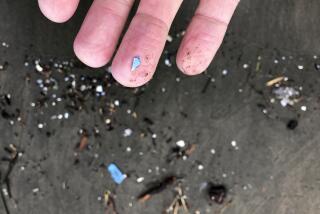Babies Show High Levels of Chemical
- Share via
A Harvard study of babies in hospital intensive care units has found new evidence of high levels of a hormone-altering chemical in newborns treated with plastic medical devices.
Some intravenous lines, blood bags, feeding tubes and a variety of other medical equipment contain the chemical, a phthalate called DEHP, which is widely used to make vinyl soft and flexible. In a study conducted at two hospitals in the Boston area, babies undergoing the most intensive care with the plastic devices, particularly endotracheal tubes and umbilical vein catheters, had five times more DEHP in their bodies than babies who were not treated with them.
The findings add to a growing body of research that has found that phthalates, also used in cosmetics, are ubiquitous in human bodies and has raised questions about their safety, particularly for baby boys.
The scientists at the Harvard School of Public Health did not examine the effects on the study’s 54 critically ill or premature babies at the neonatal intensive care units. But in laboratory tests on animals, DEHP blocks testosterone and causes testicular damage. Last month, scientists found that male babies exposed to four phthalates in the womb were born with slightly altered genitals, although DEHP, the type found in medical equipment, was not one of them.
Since 2002, the Food and Drug Administration has advised hospitals to limit use of medical devices that contain phthalates. But the agency has not banned them and many neonatal units still use them despite the availability of alternatives.
In the study, significantly lower phthalate levels were found in the urine of babies at the hospital that had switched to some DEHP-free devices.
“The more products being used, the higher the level of [phthalate metabolites] found in urine,” said Howard Hu, a professor of occupational and environmental medicine who was the lead researcher in the study, which was published online Wednesday in the journal Environmental Health Perspectives.
“Our study not only demonstrates that [neonatal intensive care] infants ... are exposed to demonstrably high levels of DEHP, but we have also clearly linked the intensity of DEHP product use with the amount of DEHP that enters infants’ bodies,” Hu said.
Antonia Calafat, a researcher with the Centers for Disease Control and Prevention and a co-author of the study, said the amounts in the most highly exposed infants were 17 times higher than the amounts found in the general population of U.S. children.
Representatives of the American Chemistry Council, a trade group for the chemical industry, said Wednesday that the new study “states the obvious -- newborns who receive intensive care, perhaps to save their lives, have measured phthalate levels above the average.”
The industry officials stressed that the levels in the newborns were lower than the doses that showed no effect on lab animals.
The study authors agreed, although they did not include such comparisons in their report because of differences between their research and the animal studies. They said it was possible that some babies undergoing very intensive or lengthy treatment with the devices had doses higher than those that harmed the rats.
“Based on our results and what we know about the toxicity of DEHP from studies in laboratory animals, we need to better understand whether there are potential health risks” to babies in hospitals, said co-author Russ Hauser, a Harvard associate professor of occupational health.
Health Care Without Harm, a coalition of 435 health and environmental groups in 53 countries, urged hospitals on Wednesday to immediately stop using the vinyl devices and switch to ones that are DEHP-free.
The FDA recommends that hospitals substitute non-phthalate medical equipment when treating infant boys or pregnant women carrying boys. Although adults are also exposed to phthalates from medical equipment, the greatest risk is for baby boys and male fetuses, whose reproductive organs are developing.
Baxter International Inc., one of the world’s leading producers of medical devices, would not comment Wednesday on the new study. But the company’s website said that vinyl containing DEHP has been used safely in medical equipment for 40 years and that it remained the “material of choice” for many important devices because of its flexibility. The company emphasized that there was no evidence of harm to human beings.
“When DEHP-plasticized PVC provides the best overall performance, Baxter will continue to use it,” said the company’s position paper on the topic.
Valerie Briscoe, a neonatal clinical nurse specialist at John Muir Medical Center in Walnut Creek, Calif., said her hospital already eliminated all DEHP products in its neonatal unit.
“This study confirms my concern that [hospitals] should really move forward on this,” Briscoe said.
Briscoe said that the switch in equipment was made “with no substantial cost impact to the hospital” and no adverse effects on the babies’ treatments.
“Ninety-nine percent of the products have alternatives out there,” she said.
Kaiser Permanente also has phased out the devices in neonatal units, and is working to find substitutes for other uses, such as building materials and carpeting.
DEHP is the highest volume phthalate in production, used in a variety of PVC products such as flooring, toys, food containers and automobile parts.
Other phthalates are used as ingredients in nail polish, fragrances and other beauty products.






